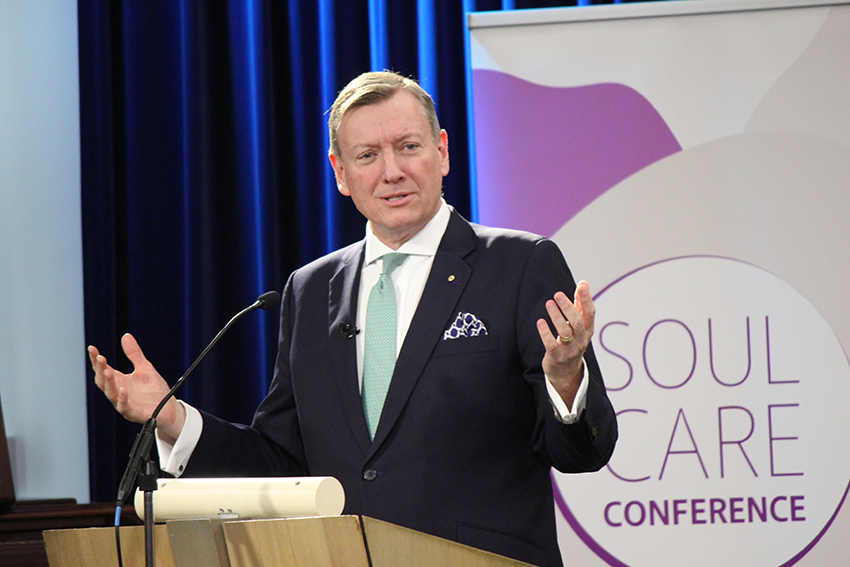Content warning: The following article contains some discussion of suicide.
Lifeline National Board Chair John Brogden delivered a keynote address to the Soul Care conference at Wesley Mission Centre Sydney on Wednesday, 31 August.
In a wide ranging address, the former Opposition leader directly addressed suicide, including his own attempt to take his own life in 2006, and stigmas surrounding attempts.
“I’m on a bit of a crusade to talk about, not just lived experience, but living experience,” he said. “Lived experience suggests your depression has come and gone. In my case, living with depression and suicidal ideation, probably for the rest of my life, this is a living experience.”
Mr Brogden noted that it was significant to be addressing people in the building where Lifeline started.
Rev. Dr Alan Walker received a phone call from someone looking to commit suicide.
The Kings Cross police later called to indicate that the man had followed through on the threat.
“It was at that point that Alan Walker decided to (form) Lifeline,” Mr Brogden said.
The time that Lifeline was formed, he said, was during a time when suicide was heavily stigmatised. Doctors who were at the place of death would often “fib” in order to cover up what had happened.
“That puts it in even greater context than you might consider,” Mr Brodgen said.
Rev. Dr Walker also went on to form Lifeline International. Currently, this organisation is working on a worldwide campaign to destigmatise suicide, which remains a crime in around 35 countries.
“For an unsuccessful suicide attempt (in these countries) the punishment is gaol time,” he said. “Now, don’t look down your nose (at these countries) because we were there 60 years ago. We need to move forward and work with these countries…to try and end this injustice.”
Of the ways to prevent suicide, Mr Brogden mentioned removing the means (such as by putting fences on bridges) and setting up crisis lines.
“If our assessment of that person is that there is a high risk of suicide, we would call an ambulance and police to that person,” he said.
On average, Lifeline Australia answers some 3600 calls from people. According to Mr Brogden, before Australia’s bushfires in 2019 and the pandemic, it was around 2,000.
Mr Brogden noted that suicide itself decreased by six percent during 2020 to 2021, but noted that there was a greater demand for Lifeline and more instances of self-harm.
“I’m now convinced that the more people that reach out to us at Lifeline, the better.”
“I would prefer those people reaching out than suffering in silence.”
He said he hoped that one of the good things that could come out of COVID was that people could talk more about mental health.
“We’re there to be used…If people are reaching out to use us, I couldn’t be happier.”
Mr Brogden was previously the State Opposition Leader, the youngest person to ever hold this role.
He was diagnosed with depression in 2006 after an attempt to take his own life. This, he said, was following long-term issues with suicide ideation dating back to when he was 10.
The Soul Care Conference is underway at Wesley Mission Sydney Centre from 31 August to 2 September.
If this article has brought issues up for you, help is available. Contact Lifeline on 13 11 14.













